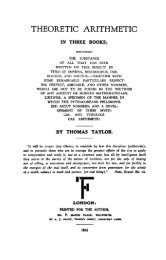The Mystical Hymns of Orpheus - Platonic Philosophy
The Mystical Hymns of Orpheus - Platonic Philosophy
The Mystical Hymns of Orpheus - Platonic Philosophy
You also want an ePaper? Increase the reach of your titles
YUMPU automatically turns print PDFs into web optimized ePapers that Google loves.
I 62 THE MYSTICAL HYMNS<br />
Thy sleep perpetual bursts the vivid folds<br />
By which the soul attracting body holds 117 :<br />
Common to all, <strong>of</strong> ev'ry sex and age,<br />
For nought escapes thy all-destructive rage.<br />
For can it for a moment be supposed that <strong>Orpheus</strong> would<br />
pray that he might be able<br />
Bvpov r'au pevos <strong>of</strong>v KariaXEpcv, os p'~peO~a~<br />
9uXoatGos ~puepqs<br />
eai/3acvep~v. -<br />
"To restrain the impetuous force <strong>of</strong> anger, which excites<br />
him to engage in horrid war ! "<br />
"7 What is said in this and the preceding line is well<br />
explained by Porphyry in his excellent treatise entitled<br />
At$oppai apos ra voyTa, or Auxiliaries to the Perception <strong>of</strong><br />
Intelligibles, viz. "That which nature binds, nature also<br />
dissolves : and that which the soul binds, the soul likewise<br />
dissolves. Nature, indeed, bound the body to the soul ;<br />
but the soul binds herself to the body. Nature, therefore,<br />
liberates the body from the soul ; but the soul liberates<br />
herself from the body." And again, in the next sentence,<br />
Hence there is a tw<strong>of</strong>old death ; the one, indeed, univer-<br />
sally known, in which the body is liberated from the soul ;<br />
but the other peculiar to philosophers, in which the soul is<br />
liberated f rotn the body. Nor does the one entirely follow<br />
the other." <strong>The</strong> meaning <strong>of</strong> this tw<strong>of</strong>old death is as<br />
follows : Though the body, by the death which is univer-<br />
sally known, may be loosened from the soul, yet while<br />
material passions and affections reside in the soul, the soul<br />
will continually verge to another body, and as long as this<br />
inclination continues, remain connected with body. But<br />
when, from the predominance <strong>of</strong> an intellectual nature, the<br />
soul is separated from material affections, it is truly libe-<br />
rated from the body ; though the body at the same time<br />
verges and clings to the soul, as to the immediate cause <strong>of</strong><br />
its support.

















